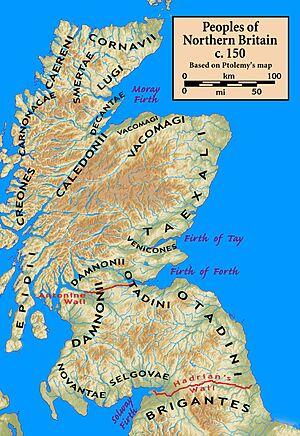Epidii facts for kids
The Epidii were an ancient people who lived in what is now Scotland. We know about them because a geographer named Ptolemy wrote about them around the year 150 AD. He mentioned them in his maps and writings about the world.
Historians believe the Epidii lived in the area of modern Argyll, especially around the island of Islay. Ptolemy didn't list a main town for them, but another old text, the Ravenna Cosmography, mentions a place called Rauatonium. People think this might have been Southend.
What Does Their Name Mean?
The name Epidii comes from a very old word, epos, which means "horse." This word is part of the P-Celtic language group, like old Welsh. For example, the Welsh word for "foal" (a baby horse) is ebol.
Some people think the Epidii might have been named after a horse god, perhaps called *Epidios. This suggests horses were very important to them, maybe for travel, farming, or even in their beliefs.
What Language Did They Speak?
Even though their name sounds like it comes from a P-Celtic language, some experts, like Dr. Ewan Campbell, think the Epidii might have spoken a different language called Goidelic, or Q-Celtic. This is the language group that later led to Scottish Gaelic and Irish.
Dr. Campbell suggests that Ptolemy's information might have come from people who spoke P-Celtic, and they might have used a P-Celtic name for a tribe that actually spoke Goidelic.
The land where the Epidii lived later became the heart of a Goidelic kingdom called Dál Riata. This makes some historians, like Alex Woolf, wonder if the Epidii eventually became the people of Dál Riata. He also thinks that the Hebrides islands, which Ptolemy called the Ebudae, might have been named after the Epidii.
See Also
 | Bessie Coleman |
 | Spann Watson |
 | Jill E. Brown |
 | Sherman W. White |


